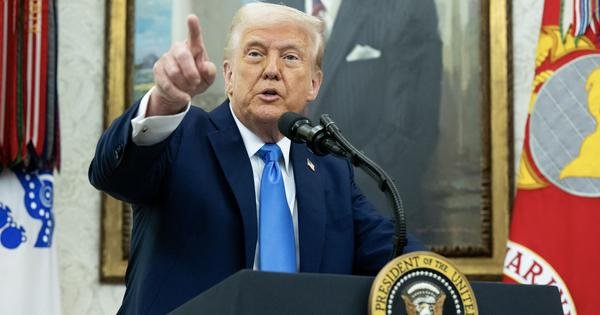How Trump Might Attempt to Stay in Power After His Second Term
Trump’s Third Term Hints
In an interview with NBC on March 30, 2025, President Donald Trump revealed that he was “not joking” about seeking a third term in office, despite the Constitution’s prohibition. He suggested that there are “methods” to achieve this.
Trump has been hinting at a third term for months, even though the 22nd Amendment to the Constitution clearly states that no person can be elected to the office of the President more than twice. This amendment was passed in response to Franklin Roosevelt’s four elections to the presidency.
The 22nd Amendment
The 22nd Amendment does not differentiate between consecutive and nonconsecutive terms in office. Since Trump has already been elected president twice, the plain language of the amendment bars him from being elected a third time.
However, the 22nd Amendment does not prevent Trump from serving as president beyond January 20, 2029. This is because the amendment only prohibits someone from being “elected” more than twice. It does not address someone becoming president in a way other than being elected to the office.
Alternate Scenarios
There are a few potential alternate scenarios for Trump to stay in power, although they would be nearly impossible under normal circumstances. Trump has a history of pushing the limits of presidential power and has shown a willingness to bend or even break the law to stay in office.
Once he leaves office, Trump could also face criminal prosecution and possible jail time, further motivating him to stay in power. As Trump’s second term progresses, Americans may hear more about how he might try to stay in office.
Other Ways to Become President
Nine people have served as president without first being elected to that office. They were all vice presidents who stepped into the office when their predecessors either died or resigned. The 22nd Amendment does not bar a term-limited president from being elected vice president.
However, the 12th Amendment states that “no person constitutionally ineligible to the office of the President shall be eligible to that of the Vice-President of the United States.” It is unclear whether this restriction applies to a two-term president who is ineligible for a third term because of the 22nd Amendment.
The 25th Amendment
The 25th Amendment to the Constitution states that if a president declares that “he is unable to discharge the powers and duties of the office … such powers and duties shall be discharged by the Vice President as Acting President.” This has happened three times in US history, with George H.W. Bush, Dick Cheney, and Kamala Harris serving as acting presidents.
In this scenario, shortly after taking office on Jan. 20, 2029, President Vance could invoke the 25th Amendment by notifying the speaker of the House and the president pro tempore of the Senate that he is unable to discharge the duties of president. Vice President Trump would then become acting president and assume the powers of the presidency until such time as President Vance issued a new notification indicating that he was able to resume his duties as president.
Tandemocracy
Trump could also follow the example of the Medvedev-Putin “tandemocracy” in Russia. In 2008, term limits in the Russian constitution prevented Putin from running for president after two consecutive terms. Instead, he selected a loyal subordinate, Dmitry Medvedev, to run for president.
When elected, Medvedev appointed Putin as his prime minister. By most accounts, Putin remained firmly in power and made most of the important decisions. Following this example, a future Republican president could appoint Trump to an executive branch position from which he could still exercise power.
Using a Figurehead
Alternatively, Trump could follow the example of George and Lurleen Wallace in Alabama. In 1966, the Alabama Constitution prevented Wallace from running for a third consecutive term as governor. Still immensely popular and unwilling to give up power, Wallace chose to have his wife, Lurleen, run for governor. It was clear from the beginning that Lurleen was just a figurehead for George, who promised to be an adviser to his wife, at a salary of $1 a year.
The campaign’s slogan of “Two Governors, One Cause” made it clear that a vote for Lurleen was really a vote for George. Lurleen won in a landslide.
According to one account of her time in office, the Wallaces had “something of a Queen-Prime Minister relationship: Mrs. Wallace handles the ceremonial and formal duties of state. Mr. Wallace draws the grand outlines of state policy and sees that it is carried out”.
Trump’s wife was not born a US citizen and therefore isn’t eligible to be president. But as the head of the Republican Party, Trump could ensure that the next GOP presidential candidate was a member of his family or some other person who would be absolutely loyal and obedient to him. If that person went on to win the White House in 2028, Trump could serve as an unofficial adviser, allowing him to continue to wield the power of the presidency without the actual title.




